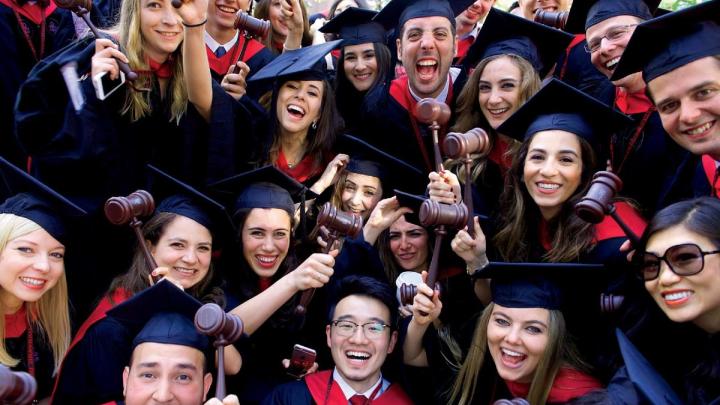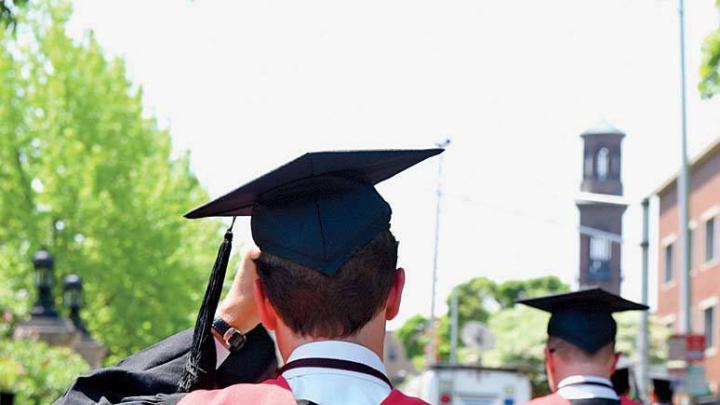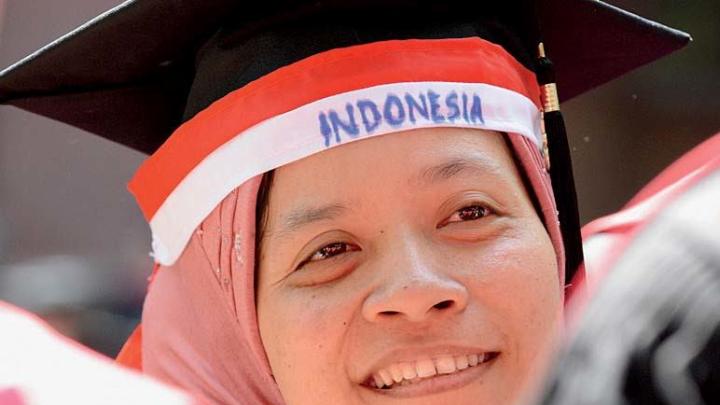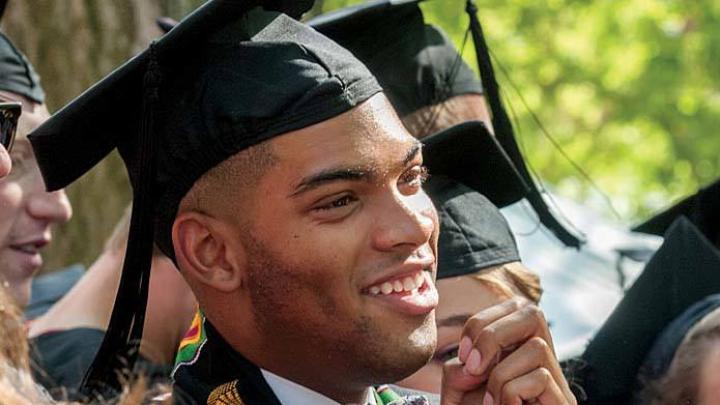For the 365th Commencement, Harvard went Hollywood, with headline speakers Steven Spielberg (the afternoon exercises), Rashida Jones ’97 (College class day), and Sarah Jessica Parker (Law School class day). The set designers did their work well: for the second year in a row, the Big Day itself was spectacularly summery, verging on hot (but clear, nary a storm in sight), with lilacs and dogwoods lingering in bloom after a long, cool spring.
In the cinematic vein, the University itself unspooled some carefully prepared narratives this year. President Drew Faust began formal acknowledgment of Harvard’s past entanglement with slavery, welcomed Air Force ROTC back to campus, and chatted about the arts and humanities with Conan O’Brien ’85. Other staged appearances featured visitors Al Gore ’69, LL.D. ’94 (work on climate change in China) and Stephen Hawking, S.D. ’90 (black holes—where, as in China, the sun doesn’t shine).
Of course, there were unscripted stories, too: the long, bitter protests and sit-in at the Law School, aimed at addressing perceived deficiencies in diversity and inclusion (see an image in the photo gallery below); the Free Harvard/Fair Harvard slate of petition candidates for election to the Board of Overseers; and the year-ending controversy over new College policies aimed at reining in single-sex final clubs and other social organizations.
As if counter-programming the sunny backdrop and the intramural concerns of the preceding semesters, much of the week itself focused on the world beyond, in decidedly darker tones. On Tuesday morning, Cogan University Professor Stephen Greenblatt, orator for the Phi Beta Kappa literary exercises, drew on a personal experience of anti-Semitism and his immersion in The Merchant of Venice to make the case for understanding the other. He concluded with a commentary on an unperformed play about Sir Thomas More, in a passage thought to be in Shakespeare’s own hand, in which a mob demands the explulsion of “strangers” from England. He told the scholar-graduates-to-be that “You will have to decide for yourselves” how to deal with “wretched strangers” in flight—“to look away or become involved, to secure your safety or to open yourselves to risk, to succor or to punish.” He wished for them “the gift of seeing the other as a human being”—as Sanders Theatre suddenly felt close to southern Europe. (See www.harvardmagazine.com/commencement for detailed reports on PBK and all the other events summarized here.)
Spirited Matherites (from left) Chris Bruno of Pompton Plains, New Jersey, Daniel Ryu of Palisades Park, New Jersey, Robert Doles of Johns Creek, Georgia, Ryan Fortin of North Reading, Massachusetts, Duncan O'Brien of Wellesley, Massachusetts, Leo Lim of Seoul, and Viviana Maymi of Tampa
Photograph by Jim Harrison

Spirited Matherites (from left) Chris Bruno of Pompton Plains, New Jersey, Daniel Ryu of Palisades Park, New Jersey, Robert Doles of Johns Creek, Georgia, Ryan Fortin of North Reading, Massachusetts, Duncan O'Brien of Wellesley, Massachusetts, Leo Lim of Seoul, and Viviana Maymi of Tampa
Photograph by Jim Harrison

Ed.M. celebrants (from left) Bethany Dawson of Huntertown, Indiana, Marcie Herring of Honolulu, and marshals Kara Lawson of Wausau, Wisconsin, and Shanae Burch of Buena, New Jersey
Photograph by Stu Rosner

Adams House faculty deans Sean Palfrey, hugging Alexandra Sperry ’16 of New York City, and Judith Palfrey presided at the diploma ceremonies.
Photograph by Jim Harrison

A new J.D. sends a message—modifying the school's former shield to reflect its slave connections
Photograph by Jim Harrison

Legally Blonde Jessica Cohen, M.B.A. ’15, J.D. ’16
Photograph courtesy of Jessica Cohen

Du Ruitao, S.M. ’16, of Foshan, Guangdong, China, was bedecked with blossoms and cash.
Photograph by Jim Harrison

Ph.D.s Anthony J. Covarrubias, of Gardena, California, and Eylul Harputlugil, of Izmir, Turkey, and New York City, were among those admitted to the ancient and universal company of scholars.
Photograph by Stu Rosner
Wednesday’s jam-packed roster of class days had a home-and-home series, of a sort. Freeman Hrabowski III, LL.D. ’10, president of the deservedly exemplary University of Maryland, Baltimore County (known nationwide for educating minorities, women, and low-income students in science, technology, engineering, and math), spoke to the Graduate School of Education candidates just days after Faust spoke at UMBC’s graduation—her first non-Harvard commencement address. “[M]any colleges—most colleges—have not figured out how to do as good a job as UMBC at enabling all students to reach their highest potential,” she said.
Hrabowski’s Cambridge remarks were preceded by, and turned out to echo, a moment that went viral: Ed.M. candidate Donovan Livingston’s spoken-word poem, “Lift Off,” on freedom, education, and equality—and on African Americans’ difficult, entwining histories with all three. (“As educators, rather than raising your voices/Over the rustling of our chains,/Take them off. Un-cuff us.…/I’ve been a Black hole in the classroom for far too long;/Absorbing everything, without allowing my light to escape./But those days are done. I belong among the stars.”). Hrabowski saluted Livingston as a “twenty-first-century Martin Luther King,” and recalled his mother’s saying, “We the teachers make the difference.”
Faust struck an almost grim tone on Thursday afternoon. After beginning noncomittally ( “[M]y assignment is to offer a few reflections on this magnificent institution at this moment in its history. And what a moment it is”), she was all business, and then some:
What is going on? What is happening to the World? The tumultuous state of American politics, spotlighted in this contentious presidential contest; the political challenges around the globe from Brazil to Brexit; the Middle East in flames; a refugee crisis in Europe; terrorists exploiting new media to perform chilling acts of brutality and murder; climate-related famine in Africa and fires in Canada. It is as if we are being visited by the horsemen of the apocalypse with war, famine, natural disaster—and, yes, even pestilence—as Zika spreads, aided by political controversy and paralysis.
On Friday, “Building an Economy for Prosperity and Equality,” the Radcliffe Day morning conversation, wasn’t quite at the Four Horsemen level of despond—the current economic indicators are relatively robust, after all, particularly in the United States. But it didn’t take long for panelist David Autor, Ph.D. ’99, an economist at MIT, to declare that the halcyon decades from the end of World War II until 1970 (robust growth, rising incomes, and widely shared prosperity) were an anomaly. Given slower productivity growth, an alarming erosion in educational and skills gains for workers, and what he called the “commodification” of unsophisticated labor under the twin hammers of globalization and technological change, he and others were downbeat. Louise Sheiner ’82, Ph.D. ’93, now at the Brookings Institution, pointed to the dismaying, divergent outcomes for those at the top and bottom of the economy: a clear and widening “inequality in life expectancy.” Most agreed that investments in education and other policy prescriptions could help close those gaps. Whether economic growth can be reignited is “the hardest part,” concluded Lee professor of economics Claudia Goldin. “Equity may be easier.”
Mirth broke through the gloom from an unexpected quarter. During the Morning Exercises, the University brass, elevated on the dais beside Memorial Church, typically adhere strictly (one is tempted to say religiously) to their elaborate script, only to be knocked off course by ebullient M.B.A.s, or gavel-wielding J.D.s, or, especially, spirited A.B.s—full of beans, and sometimes effervescing beverages, cheering their fulfillment of “the Faculty’s requirements for the first degree in Arts or in Science,” as the script puts it (even if they do not seem, just then, particularly “ready to advance knowledge, to promote understanding, and to serve society”).
This year, frisky deans did a number on themselves, beginning with Xiao-Li Meng—a professor of statistics, for goodness sake. Presenting the doctoral candidates, he said, “As dean of the Graduate School of Arts and Sciences…,” paused, then continued, “hearing no cheering,” finally elicited the desired response—but not loud enough to satisfy—and cued another round. Faust, trying to confer said doctorates, was in turn interrupted, and had to command the rowdy scholars to “wait a minute, here comes the responsibility part. You can’t leave that out.”
There were further miscues and amusements. School of Dental Medicine dean R. Bruce Donoff approached the microphone and froze as Provost Alan Garber paused. At times, students were supposed to rise but did not, or when commanded to rise were deemed to have risen already. Dean David N. Hempton ad libbed about being leader of “the huge faculty of divinity.” (The school does have longevity: it celebrates its bicentennial this coming academic year.) Graduate School of Education dean James Ryan, stopped mid introduction by the future teachers’ cheers, said, “I’m gonna forget my lines.” He didn’t, of course. All in good fun.
Compared to their graduate and professional school predecessors, the undergraduates were downright orderly, reversing the normal order of affairs. People were fanning themselves, so perhaps the temperature, by then in the low 80s, was getting to them.
After the lunch respite, it fell to Spielberg (whom Faust called “one of the greatest storytellers of our—or any other—time”) to steer a middle course between the downbeat and the daft. He did so most winningly by talking about his own trajectory. “I can remember my college graduation—which is easy, since it was only 14 years ago,” he said. “How many of you took 37 years to graduate? Like most of you, I began college in my teens, but sophomore year I was offered my dream job at Universal Studios, so I dropped out. I told my parents that if my movie career didn’t go well, I would re-enroll. It went all right.” In the end, he went back “for my kids. I’m the father of seven, and I kept insisting on the importance of going to college, but I hadn’t walked the walk. So in my fifties, I re-enrolled at Cal State, Long Beach, and I earned my degree. I just have to add, it helped that they gave me course credit in paleontology for the work that I did on Jurassic Park. Three years of Jurassic Park. Thank you.” Life lessons, learned.












